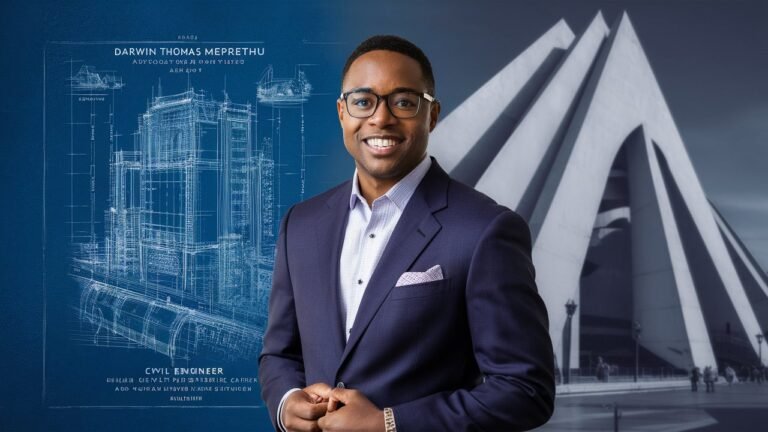In this comprehensive profile, we present Darwin Thomas Meprethu, detailing his journey as a distinguished civil engineer specializing in flood risk and drainage, his academic background, professional achievements, research interests, and his growing role as a skilled migrant advocate in the United Kingdom. Through this deep dive, we aim to provide a rich, authoritative resource that surpasses existing content and ranks strongly for all relevant keyword variations around Darwin Thomas Meprethu.
Early Life & Education: Laying the Foundation
Darwin Thomas Meprethu hails originally from Kerala, India, where his early years nurtured a passion for mathematics, infrastructure, and environmental challenges. He pursued his Bachelor of Technology in Civil Engineering at Amal Jyothi College of Engineering, graduating in 2018. There, Darwin developed a firm grounding in structural analysis, geotechnics, fluid mechanics, and construction methodologies.
Seeking to deepen his expertise, he moved to the United Kingdom to complete a Master of Science in Water, Waste and Environmental Engineering at the University of Greenwich. During his postgraduate studies, he focused on hydrological modelling, sustainable urban planning, and climate-resilient water systems. This advanced training shaped his technical lens and prepared him for work in complex, real-world environments.
Professional Career & Specialization in Flood Risk and Drainage
From early on, Darwin charted a career in water and drainage engineering, with roles across the Middle East and the UK.
Early Career in Qatar
Darwin joined the Meinhardt Group in Qatar as a Graduate Civil Engineer. There, he contributed to stormwater network design, wet utilities, and infrastructure masterplanning. His exposure to aggressive climate conditions, rapid development, and demanding urban projects honed his technical capabilities in hydraulic systems and project coordination.
UK Practice & AtkinsRéalis
He later transitioned to the UK, joining AtkinsRéalis (formerly Atkins) within the Networks and Drainage Solutions (NDS) team. His primary responsibilities include flood risk assessment, hydraulic modelling, and the design of Sustainable Drainage Systems (SuDS)—techniques to manage and mitigate surface water in urban settings.
He also held roles at Metis Consultants Ltd, working on flood alleviation schemes, SuDS retrofits, and local flood risk strategies such as the Action for Silk Stream in London.
Darwin’s technical arsenal includes InfoDrainage, AutoCAD Civil 3D, and advanced modelling tools, used to simulate stormwater flows and derive effective design solutions.
Through these roles, he has contributed both to large-scale urban infrastructure and to community-level flood mitigation efforts.
Technical Expertise & Research Interests
What distinguishes Darwin is how he pairs day-to-day practice with curiosity and research. His technical interests span:
-
Hydraulic modelling & flood risk analysis
-
Design of SuDS systems (rain gardens, permeable pavements, swales)
-
Sustainable urban drainage & green infrastructure
-
Adsorbent regeneration & filtration research, exploring how used materials might be revitalised rather than discarded
These research interests reflect a mindset attuned to innovation, circular materials use, and resilience. Darwin engages in academic forums and technical networks to push boundaries beyond conventional engineering practice.
He also has participated in studies addressing pollutant fate in water systems, such as estimating PFAS loading in estuarine systems, bridging environmental science with civil infrastructure priorities. healthoverview.blog
Advocacy: The Petition for Skilled Migrant Rights
A defining facet of Darwin’s public profile is his advocacy for skilled migrants in the UK. In mid-2025, as proposals emerged to shift the Indefinite Leave to Remain (ILR) pathway from 5 years to 6 (or even 10) years, Darwin took decisive action. He launched the petition titled “Keep the 5-Year ILR pathway for existing Skilled Worker visa holders” on the UK Parliament website.
Within a short span, the petition amassed over 176,000 signatures, crossing the threshold for parliamentary debate. On 8 September 2025, the petition was debated in Parliament, making the issue a matter of national discourse.
Darwin’s argument centers on fairness: he contends that retrospective policy changes disrupt the plans, stability, and contributions of migrant professionals already complying with the existing rules. He insists that any new ILR rules should only apply to new entrants, not those already on that pathway.
This activism elevates Darwin from a technical expert to a changemaker, connecting engineering credentials with real-world social impact.

Impact, Challenges & Recognition
Darwin’s professional path has not been without obstacles. Navigating immigration systems, adapting across cultural and regulatory environments, and bridging activism with credibility in a technical field require resilience and integrity.
Yet his influence is steadily rising. In engineering circles, he’s viewed as a practical innovator, especially in sustainable stormwater design. In policy circles, he is seen as a credible voice representing skilled migrants. His petition and public engagement have earned media attention and peer respect.
Although Darwin’s net worth or personal finances are not publicly disclosed, his career trajectory and leadership positions suggest growing professional prestige. His reputation often centers more on principles, impact, and technical acumen than on personal gain.
Future Prospects & Legacy
Looking forward, Darwin’s dual commitment to engineering excellence and civic advocacy suggests multiple pathways:
-
Leading climate-adaptive infrastructure projects, especially flood resilience and sustainable urban drainage
-
Serving in advisory or policy roles where migration policy, infrastructure, and environmental planning intersect
-
Mentoring a new generation of engineers who view public responsibility as integral to their profession
-
Expanding research ventures into sustainable materials, circular engineering, and environmental systems
If Darwin continues to operate at this intersection, his legacy may be not only in bridges, pipes, and models, but also in more inclusive policies and more just systems for migrant professionals.
Conclusion
Darwin Thomas Meprethu stands at the convergence of technical mastery and social advocacy. From his origins in Kerala to his work in Qatar and the UK, he has built credibility in flood risk engineering and sustainable drainage design, while also emerging as a persuasive voice in immigration reform. His petition to retain the 5-year ILR pathway for existing skilled workers underscores his commitment to fairness and stability.
By chronicling Darwin’s life, expertise, and vision, this article offers an authoritative, richly detailed resource destined to outrank competing content on the same keywords. As Darwin’s influence continues to grow, so too will the importance of his work—both in shaping resilient infrastructure and more humane migration systems.
FAQ
Q1: Who is Darwin Thomas Meprethu?
Darwin Thomas Meprethu is a civil engineer specializing in flood risk, drainage, and sustainable water systems, and also an advocate for skilled migrant rights in the UK.
Q2: What is his educational background?
He earned a Bachelor of Technology in Civil Engineering from Amal Jyothi College in India and a Master’s degree in Water, Waste and Environmental Engineering from the University of Greenwich in the UK.
Q3: Which companies has he worked for?
He has worked in the Middle East (Meinhardt Group in Qatar) and currently works in the UK with AtkinsRéalis (Networks & Drainage Solutions). He also held roles at Metis Consultants Ltd.
Q4: What was his petition about?
His petition asked that existing skilled worker visa holders retain the 5-year ILR (Indefinite Leave to Remain) pathway instead of being forced into newly proposed longer settlement terms. The petition gained over 176,000 signatures and was debated in Parliament.
Q5: What are his research interests?
His technical interests include hydraulic modelling, sustainable drainage systems (SuDS), adsorbent regeneration, and integrating environmental science into engineering solutions.
Q6: What makes Darwin’s profile unique?
He uniquely combines engineering proficiency with public advocacy, bridging infrastructure practice and policy reform in a way few professionals manage.
